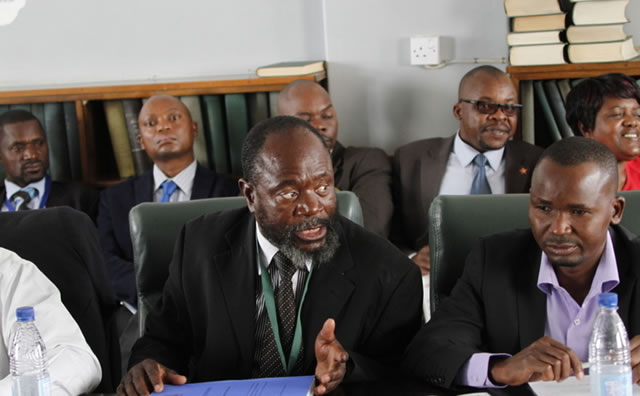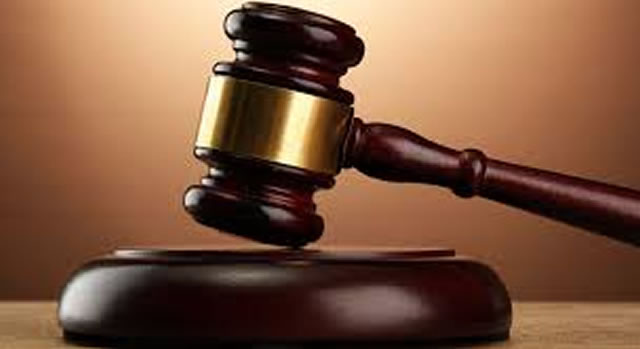Give whistle-blowers maximum protection


Buhera South MP Joseph Chinotimba speaks during the Parliamentary Portfolio Committee on Local Government,Public Works and National Housing earlier this year. The protection of witnesses and whistle-blowers who appear before parliamentary committees is critical to fighting corruption
Lloyd Gumbo Mr Speakers Sir
The legislature must be severe with those who disregard its proceedings.
We cannot have a situation where some individuals consider themselves more powerful than the third pillar of State by arrogantly punishing people for giving evidence before it.
As such, it is gratifying to note that the House has taken exception to recent action by Chitungwiza Municipality management who suspended three employees for exposing the rot at the local authority.
We are thankful that the Portfolio Committee on Public Service, Labour and Social Welfare, to whom the trio gave evidence, has taken the onus to have Parliament issue a certificate of privilege so that they can go back to work.
As a result, the House adopted the motion on Wednesday, which should see the three employees -Ephraim Katsina, Ngonidzashe Marau and Tamson Bamusi – going back to work.
Chegutu West MP Dexter Nduna raised some pertinent issues while steering the motion on Wednesday.
“Mr Speaker Sir, I pose the question how can we stand aside and let employees suffer a double tragedy of first, labour without pay and, secondly, being unjustly suspended for blowing the whistle on graft when the directors and managers of a local authority abuse their offices and privileged positions for undue enrichment, amassing of wealth and derivation of undue gains and benefits at the expense of the suffering employees?” queried Nduna.
He added: “If we allow them to be suspended for giving evidence before a committee of Parliament and we do nothing, what message will we be sending out to the thousands of other Zimbabweans who are willing and ready to give evidence before parliamentary committees but are likely to face retribution from those in privileged positions for such an honourable act?”
It is not the first time that witnesses have faced retribution at the workplace for playing whistle-blower to errant behaviour.
In 2011, Willowvale Mazda Motor Industries management suspended Lovemore Vambe, a member of the Motor Vehicle Manufacturing Workers Union after he told parliamentarians that WMMI imported fully built but defective motor vehicles from Thailand.
Parliament issued him with a certificate of immunity and indications are that he subsequently got back to work.
It is important to note that the legislature the world over has the standard practice of protecting witnesses when they give evidence to the institution.
In Zimbabwe, the protection is enshrined in Section 13 of the Privileges, Immunities and Powers of Parliament Act which provides that: “(1) If a witness in or before Parliament or a committee, in the opinion of the Speaker or the chairman of the committee, as the case may be, answers fully and faithfully all questions put to him and his replies are relevant to the questions, the witness shall be entitled to apply for and be issued with a certificate by the Speaker or the chairman of the committee, as the case may be, stating that the witness was upon his examination so required to answer and did so answer all such questions.”
But is the provision sufficient to protect witnesses and inspire confidence in would-be witnesses?
Should Parliament summon people only to render them vulnerable to consistent abuse once they leave the chamber even if they are issued with a certificate of privilege?
Should witnesses first face retribution before Parliament intervenes?
Are witnesses not having sleepless nights once they know they are going to give evidence to the august House or are they not looking at their spouses and children as they walk to the House and say to the family ‘that’s the end of bread and butter on the table’?
If not, why do witnesses, a majority of them except a few testifying on non-controversial issues, seem to have shoes that are so uncomfortable that one sees traces of pain in their eyes as they run down the story of their life or their work?
It must be noted that we do not have sufficient laws for the protection of witnesses especially on employment relations after giving evidence.
Parliament by nature should at least be the supreme body in upholding the freedom of and the protection of witnesses once they leave the precincts of Parliament.
It is important that Parliament goes beyond issuing certificates of privilege by coming up with deterrent measures to make sure witnesses are not victimised by their superiors, be it ministers or managers.
It must be pointed out that the protection of witnesses is at the fore of parliamentary business.
Erskine May’s famous treatise on Law, Privileges, Proceedings and Usage of Parliament under the section “Molestation of or interference with witnesses” states that it is a contempt to deter prospective witnesses from giving evidence before either House or a committee, or to molest any persons attending either House as witnesses, during their attendance in such House or committee.
“The House resolved in 1688 that it is the undoubted right of this House that all witnesses summoned to attend this House, or any committee appointed by it, have the privilege of this House in coming, staying and returning.
“While each House punishes misconduct with severity, it is careful to protect witnesses from the consequences of their evidence given by order of the House . . . ”
Based on this principle, May says “any molestation of, or threats against persons who have given evidence before either House or before committees of either House will be treated by the House concerned as a breach of privilege”.
Is our Parliament doing enough in this regard?
Is Parliament training and educating the public that all is well as they go on about their businesses of witnessing?
Some witnesses have refused to give what they deem sensitive information while appearing before portfolio committees for fear of reprisals from the powers that be.
As such, this breeds corruption because whistleblowers are afraid to speak out for fear of the consequences.
We should take a leaf from other jurisdictions on how they ensure witnesses are protected when they give evidence before parliamentarians.
For instance, under the Australian system, it is an offence punishable by fine or imprisonment to interfere with a parliamentary witness.
“Specifically, witnesses may not be improperly influenced by fraud, intimidation, force or threat nor may they be offered any inducement or bribe in relation to their evidence. No penalty or injury may be inflicted on a witness on account of their evidence,” reads Australia’s Parliamentary website.
Council of Europe Parliamentary Assembly resolved in 2010 that there was need to protect whistle-blowers acknowledging that potential whistle-blowers were often discouraged by the fear of reprisals.
“Whistle-blowing has always required courage and determination and whistle-blowers should at least be given a fighting chance to ensure that their warnings are heard without risking their livelihoods and those of their families.
“Relevant legislation must first and foremost provide a safe alternative to silence and not offer potential whistle-blowers a ‘cardboard shield’ that would entrap them by giving them a false sense of security,” reads part of the resolution.
If Parliament is serious about fighting the scourge of corruption then it must do more to protect witnesses by charging with contempt officials who victimise witnesses for giving evidence before the legislature.
But the legislature must also put mechanisms in place to ensure witnesses do not abuse the privileges by making unsubstantiated claims with the intention of tarnishing the image of their superiors.
Surely, a certificate of privilege is not sufficient to inspire confidence in would-be witnesses and to deter would-be offenders.









Comments